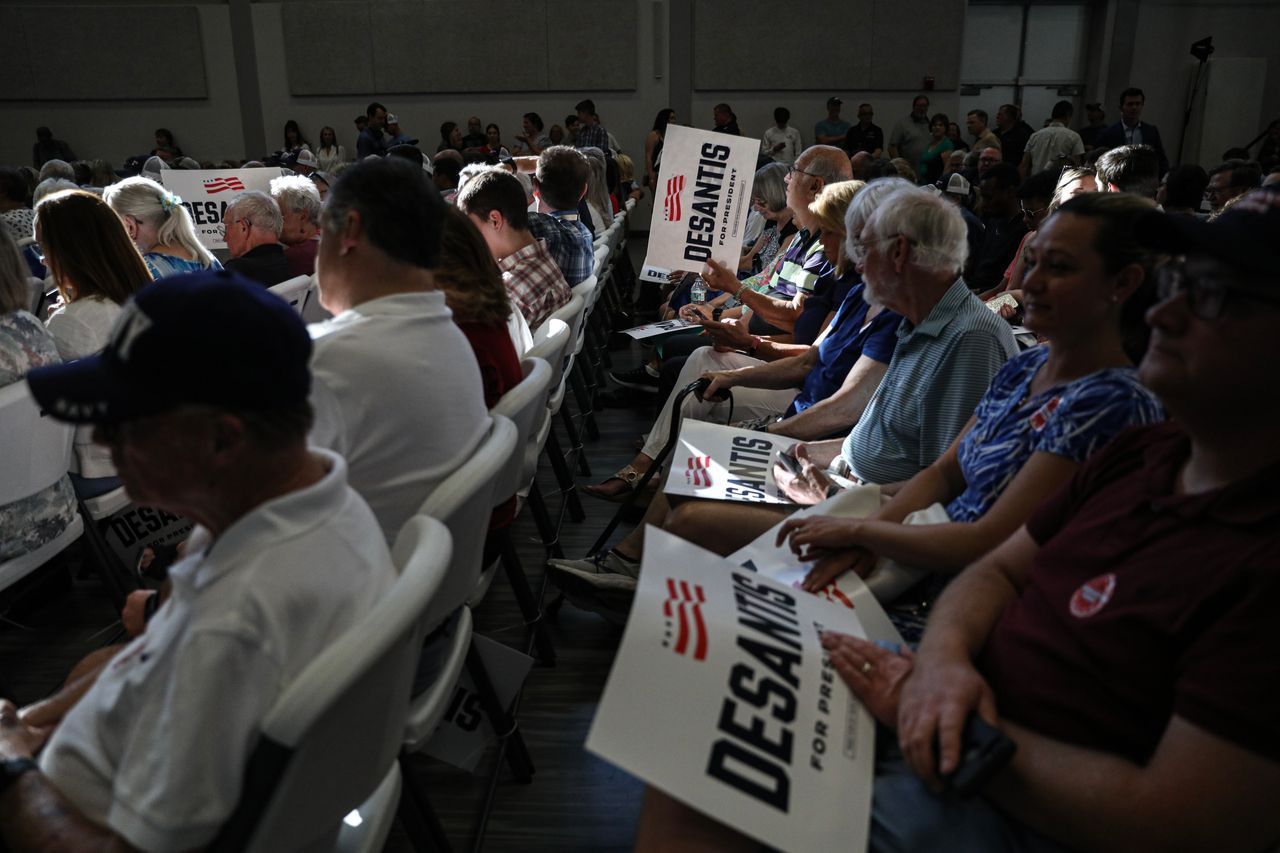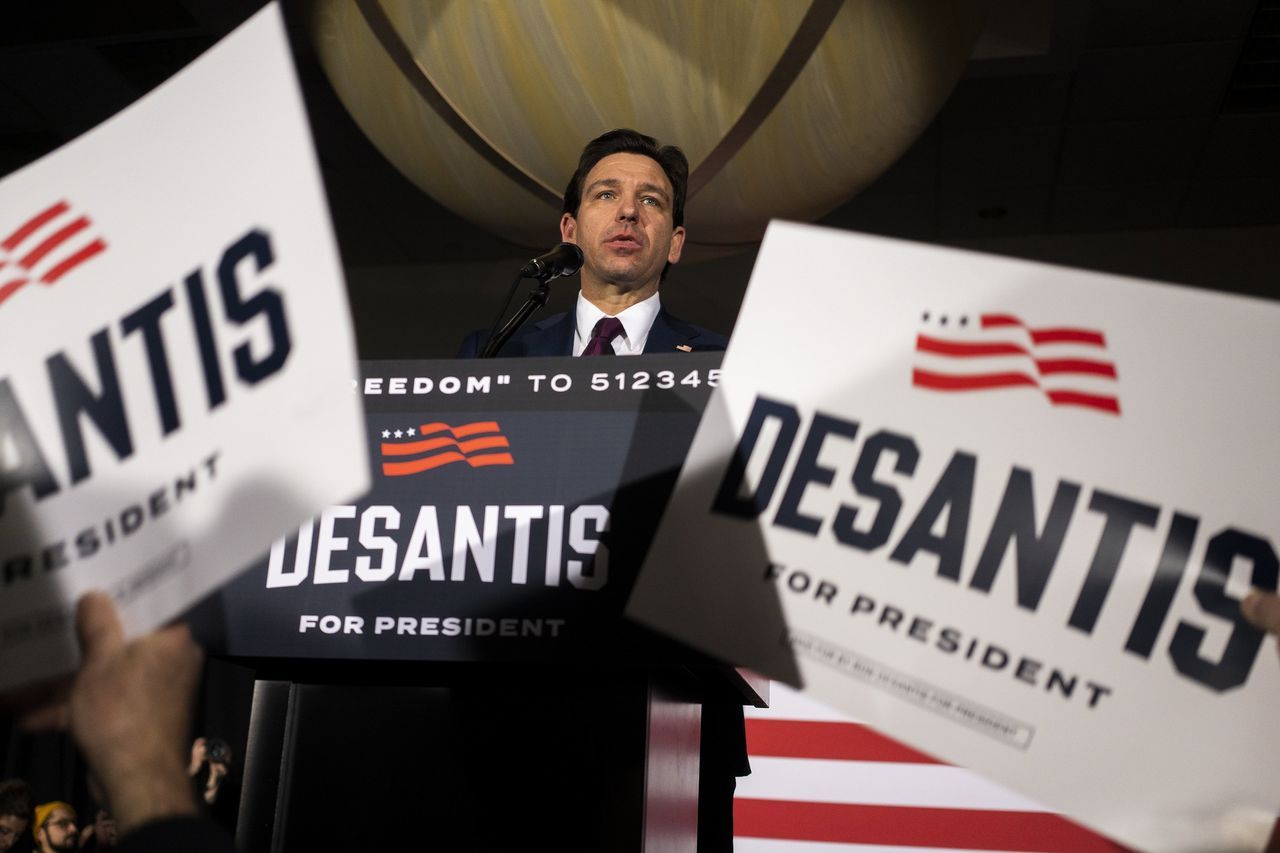MANCHESTER, N.H.—Ron DeSantis ended his presidential bid, a crushing defeat for a figure who once represented the strongest hope for Republicans wanting to move past Donald Trump but one who misread the former president’s durability, overestimated his own political skill and struggled through reboot after reboot.
The Florida governor withdrew on Sunday and endorsed Trump, two days before New Hampshire voters were poised to hand Trump another primary win. Now the race is down to Trump and Nikki Haley, the former South Carolina governor, who has been the closest competitor in New Hampshire, even though the former president remains dominant in polls there and the states to follow on the primary calendar.
“I am today suspending my campaign,” DeSantis said in a video posted on social media. “It’s clear to me that a majority of Republican primary voters want to give Donald Trump another chance.”
DeSantis, 45 years old, said he was endorsing Trump “because we can’t go back to the old Republican guard of yesteryear, or a repackaged form of warmed-over corporatism that Nikki Haley represents.”
The Trump campaign said it was honored by the endorsement, adding, “It is now time for all Republicans to rally behind President Trump” to defeat President Biden in November. Susie Wiles, a former DeSantis adviser who is now a top Trump campaign strategist, was more succinct in a social-media post: “Bye, bye.”
DeSantis, whose campaign announcement in May was a glitch-filled disaster, placed a distant second in Iowa’s caucuses and insisted he would continue in the race. But he was polling badly in New Hampshire behind Haley and Trump.
The support DeSantis was drawing in New Hampshire will likely go to Trump, widening his lead. Another decisive victory here for the former president could make him nearly impossible to stop. Trump is performing strongly in South Carolina, which holds its primary Feb. 24.
Haley said Sunday that DeSantis ran a great race and has done well as governor. “Having said that, it’s now one fella and one lady left,” she said at an event Sunday.
Like DeSantis, Haley had hoped to bring the race to a one-on-one contest with Trump, reasoning that Republicans could begin to coalesce around their candidacy. But an analysis by 538 of national GOP primary polls taken in November and December found that Trump was the second choice of 48% of DeSantis supporters, compared with 27% who picked Haley as their second choice.
From the beginning, DeSantis failed to live up to the hype that surrounded him.
His hard turn against Covid-19 restrictions earned him national acclaim among Republicans and made him a target of the Biden administration. DeSantis won re-election in a landslide in November 2022, portraying himself as a rare GOP winner in an otherwise disappointing midterm season. A campaign ad implied he was chosen by God.
The governor used a GOP supermajority in Tallahassee to craft a conservative agenda ready-made for future campaign commercials—to many, his every move seemed calculated to appeal nationally, including the war with Walt Disney Co. He cast himself as an effective, drama-free fighter, setting up an implicit contrast with Trump. Some hypothetical polls showed him in striking distance of Trump.
The former president didn’t wait long to start attacking him as “Desanctimonious” and reminding audiences that his endorsement of DeSantis helped him beat a better positioned Republican in the 2018 gubernatorial primary. That disloyalty attack stuck with voters; even people who like DeSantis said he should have waited his turn.
DeSantis was hesitant to hit back, embarking on a nearly impossible task of trying to court Trump voters without them viewing him as trying to hurt Trump. In recent weeks DeSantis had escalated contrasts with Trump but it was too late. DeSantis was also slow to embrace the national news media, limiting his exposure.
The governor proved to be an awkward campaigner at times, seeming uncomfortable interacting with voters at the retail level. Critics of his efforts on the trail said he struggled to display humor and warmth.
His campaign also suffered from deep organizational problems. DeSantis chose to outsource much of his campaign to an outside group led by people who didn’t know him well. Internal battles soon spilled into public view. He tried to move into Trump’s lane, not grasping how loyal those supporters were and alienating more moderate voters with his emphasis on conservative policies, including abortion.
Major Republican donors, many of whom want the GOP to move on from Trump, began to lose patience when DeSantis in March called Russia’s invasion of Ukraine a “territorial dispute.” The DeSantis team drew more negative attention when it distributed a bizarre video with images of muscular men and drag queens, characterizing Trump as soft on LGBTQ issues.
By July 2023, DeSantis was stalled. His standing in the GOP race never recovered.
His campaign burned through tens of millions of dollars only to move backward in the polls, and political-action committees spent nearly $60 million advertising on his behalf, according to AdImpact. Allies and detractors alike say DeSantis failed to offer an optimistic message, laboring to outflank others in the cultural wars.
“It’s like a case study on how not to run for president,” said Terry Sullivan, a Republican consultant who managed Florida Sen. Marco Rubio’s 2016 campaign.
DeSantis wasn’t the only Republican who saw Trump as vulnerable. At one point in the race, more than a dozen candidates were vying for the nomination. Then came the wave of investigations and indictments against the former president—issues that could yet derail him in the general election—but they only solidified Trump’s support within the Republican Party.

DeSantis got better as the campaign wore on, delivering strong debate performances and showing his work ethic as he barnstormed Iowa. He now returns to Tallahassee with more than two years left in his term—and a wide-open 2028 presidential election to ponder.
“There could have been another DeSantis candidacy. He could have run as the embodiment of the American dream, a middle-class kid who made it to Harvard and Yale, served in the military, was a teacher,” said Stuart Stevens, a veteran GOP strategist and Trump critic. “That’s a guy who celebrates America and opportunity and wants to expand those opportunities. That DeSantis is likable and electable.”
Added Stevens, “Instead he ran on anger.”
Jim McConnell, 77, a retired commodity trader from Swanzey, N.H., said DeSantis made some mistakes. “He didn’t start his campaign early enough and he wasn’t sufficiently forceful about Trump,” said McConnell, who showed up to see DeSantis Friday in Nashua.
Tom Barrett, a 58-year-old Florida resident who was at the event, was more forgiving and said he hopes DeSantis will look to run again in 2028. “The public has a short memory,” he said of the stumbles. “I don’t know if he did anything wrong, but the Trump juggernaut took hold.”
Write to Alex Leary at alex.leary@wsj.com



